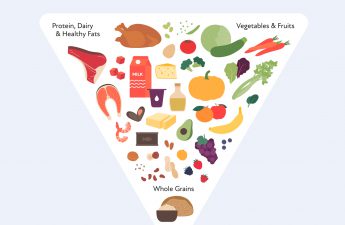
As someone who has an interest in nutrition and wellness, I’m always curious about the latest research, trends and articles about these topics. There’s no shortage of healthy eating advice available from your newsfeed, from your gym buddy, from your chiropractor and so on. I tend to get a little concerned by how trusting many can be of one-size-fits-all diets touted by self-proclaimed “nutritionists,” so that’s why I turned to registered dietitian and nutrition expert for TOPS, Dena McDowell, for some answers.
Q: Can you explain the difference between a nutritionist and a registered dietitian?
A: Yes, education is the simple answer according to the Academy of Nutrition and Dietetics. There are no educational requirements to be considered a nutritionist. In order to earn the credential of a Registered Dietitian (RD), however, higher education coursework is required along with passing the national board examination.
Q: Can you elaborate on some of the requirements that are necessary to become a registered dietitian?
A: A student wishing to pursue a career as a registered dietitian can take one of two tracks through an accredited undergraduate program. The first track is called a coordinated undergraduate program. The student in this program will complete the required coursework and rotations during four years of their program enrollment. The second track, known as a didactic program, allows the student to complete their coursework, then apply to be matched to an internship. This process is similar to how medical students are matched to their residency. Either track results in a Bachelor of Science in Dietetics or Nutrition. Upon completion of his or her degree and hours of practical experience, the student is then eligible to sit for the national registration exam. The Commission on Dietetic Registration (CDR) provides credentialing to those who successfully pass the exam. Each state also requires either certification or licensure in order to practice.
Registered dietitians are required to maintain 75 hours of continuing education every five years. Professional activities such as attending conferences, journal clubs and webinars are monitored by the CDR.
Q: What are some potential dangers to making drastic changes to your diet (i.e. drastically reducing carbohydrates) without first consulting a registered dietitian or other healthcare professional?
A: Before making any major changes to your diet, it’s important to consult with either a registered dietitian or medical doctor. Drastically reducing food groups can lead to blood sugar changes, kidney and liver problems and potential vitamin and/or mineral deficiencies over time. Bone health and even cognition (how you think/reason) may also be negatively impacted. Taking food groups out of the diet may lead to yo-yo dieting due to the difficulty in following an overly restrictive plan over time. It’s best to consult with an RD, or other healthcare professional, to discuss overall health status before embarking on any major changes.
Q: Are there any other important points you’d like people to know?
A: Changing habits is hard. The best success comes from sustaining small changes over time. Consulting with an RD is a great way to assess where you currently are and set attainable goals. They are set apart from nutritionists to be current in health trends and disease prevention. TOPS consults with registered dietitians to develop accurate and informative resources for members and chapters.
A special thanks to Dena for sharing her insight and expertise. When it comes to nutrition info from friends, online sources and elsewhere, it’s perfectly okay to put on your detective cap, be skeptical of any “cure all” claims and ask questions.
Safety first, Wellness Wednesday friends!


